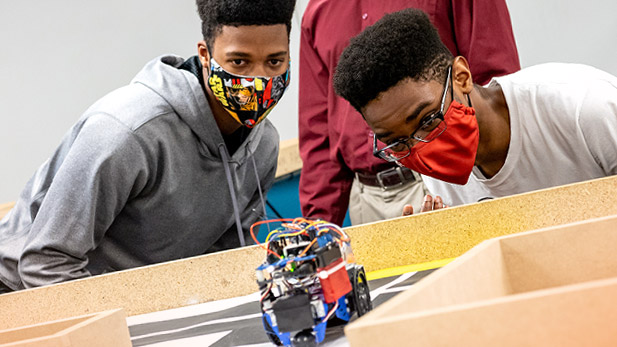Electrical and Computer Engineering Students Up to First-Year Robotics Challenge
Tuesday, November 17, 2020

This fall’s Engineering Practice course had first-year electrical and computer engineering students creating robots that picked up randomly selected objects and delivered them through autonomous and remote-control methods.
First-year electrical and computer engineering students once again met the challenge of a fall competition that required knowledge of programming, microcontrollers, and circuit building to design robots that collected objects and delivered them to a variety of places on a large game board.
The challenge culminated in an introductory Engineering Practice course that had students working individually and within teams to complete hands-on projects while learning about the importance of teamwork, communications, and technical documentation, along with knowledge of sensors, transistors, and wireless systems that will become the foundation of their college and professional careers.
Past competitions have had two teams battling to score points by picking up and delivering as many playing objects as possible within a time limit.
This fall’s contest offered several different challenges to the students’ teams. First, the robots had to drive to a specific location on the gameboard. That’s where a sensor instructed the team which of four randomly selected toy zombies or chickens would need to be picked up and then delivered to any of three drop-off zones. Extra points were awarded for completing the tasks autonomously, rather than through remote-control methods.
COVID-19 health and safety precautions had only one team competing at a time this year.
“It was very clear that the teams worked diligently and made the most of a non-traditional year,” said Assistant Professor of Electrical and Computer Engineering Zak Estrada, one of two Engineering Practice course instructors. “One of our main goals for the course is for students to explore the design process against a unique challenge given a set of constraints. We hope the students build critical thinking, teamwork and communication skills.
“We saw many unique solutions to the problem and the students had some clever ways to address different constraints posed to them,” the professor continued. “Also, we had non-competing students socially distanced in neighboring classrooms who were cheering on their classmates. We had many students come early or stay afterward to watch and cheer. That sort of enthusiasm and camaraderie really highlighted strong team-oriented thinking and passion for the study of engineering.”
Daniel Chang, associate professor of electrical and computer engineering, also taught the introductory-level course.
Scoring the most points was the robot developed by electrical engineering majors Zach Eckstrom of Elburn, Illinois, and Matthew Stepaniak of Dayton, Ohio.
Placing second was the team of electrical engineering students Luca Acquasaliente of Highland Park, Illinois, and Ethan Chastain of Glenwood, Indiana, and computer engineering major Blake Baker of Stow, Ohio.
Two teams of electrical engineering majors tied for third place. One consisted of Jacob Goodhew of Ridgeville, Indiana; Darrian Herniter of Rosedale, Indiana; and Derick Miller of Arlington, Texas. The other was formed by Bailey Hicks of Decatur, Tennessee; Andrew Hoch of Noblesville, Indiana; and Adam Korinek of Orland Park, Illinois.
A similar robotics competition is planned to test the skills of another batch of first-year students during the winter academic quarter.
The challenge culminated in an introductory Engineering Practice course that had students working individually and within teams to complete hands-on projects while learning about the importance of teamwork, communications, and technical documentation, along with knowledge of sensors, transistors, and wireless systems that will become the foundation of their college and professional careers.
Past competitions have had two teams battling to score points by picking up and delivering as many playing objects as possible within a time limit.
This fall’s contest offered several different challenges to the students’ teams. First, the robots had to drive to a specific location on the gameboard. That’s where a sensor instructed the team which of four randomly selected toy zombies or chickens would need to be picked up and then delivered to any of three drop-off zones. Extra points were awarded for completing the tasks autonomously, rather than through remote-control methods.
COVID-19 health and safety precautions had only one team competing at a time this year.
“It was very clear that the teams worked diligently and made the most of a non-traditional year,” said Assistant Professor of Electrical and Computer Engineering Zak Estrada, one of two Engineering Practice course instructors. “One of our main goals for the course is for students to explore the design process against a unique challenge given a set of constraints. We hope the students build critical thinking, teamwork and communication skills.
“We saw many unique solutions to the problem and the students had some clever ways to address different constraints posed to them,” the professor continued. “Also, we had non-competing students socially distanced in neighboring classrooms who were cheering on their classmates. We had many students come early or stay afterward to watch and cheer. That sort of enthusiasm and camaraderie really highlighted strong team-oriented thinking and passion for the study of engineering.”
Daniel Chang, associate professor of electrical and computer engineering, also taught the introductory-level course.
Scoring the most points was the robot developed by electrical engineering majors Zach Eckstrom of Elburn, Illinois, and Matthew Stepaniak of Dayton, Ohio.
Placing second was the team of electrical engineering students Luca Acquasaliente of Highland Park, Illinois, and Ethan Chastain of Glenwood, Indiana, and computer engineering major Blake Baker of Stow, Ohio.
Two teams of electrical engineering majors tied for third place. One consisted of Jacob Goodhew of Ridgeville, Indiana; Darrian Herniter of Rosedale, Indiana; and Derick Miller of Arlington, Texas. The other was formed by Bailey Hicks of Decatur, Tennessee; Andrew Hoch of Noblesville, Indiana; and Adam Korinek of Orland Park, Illinois.
A similar robotics competition is planned to test the skills of another batch of first-year students during the winter academic quarter.